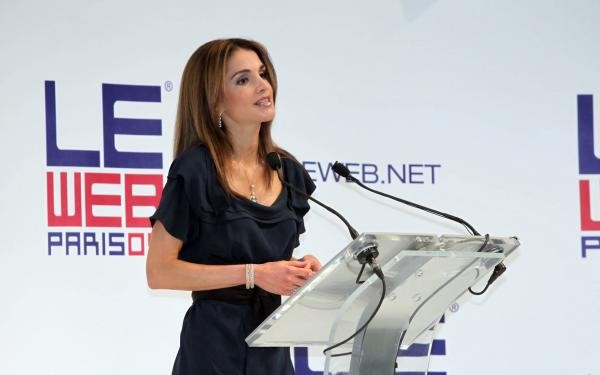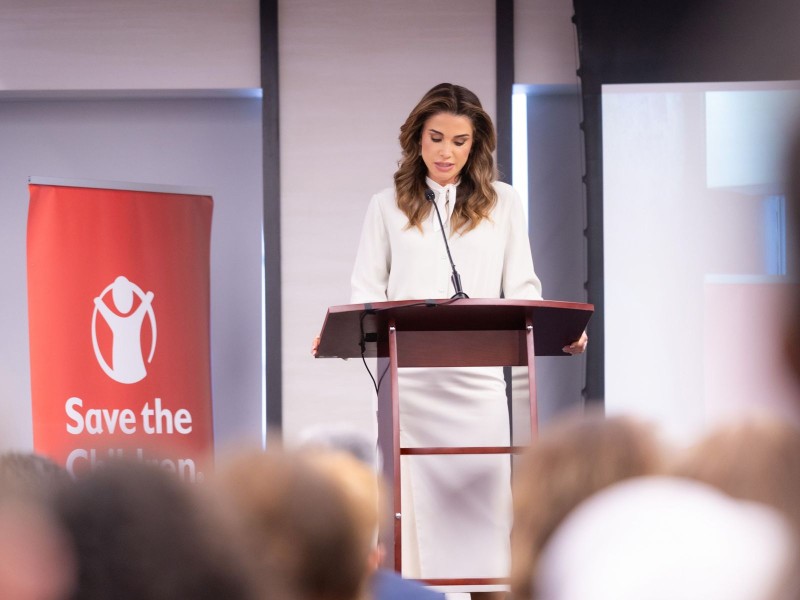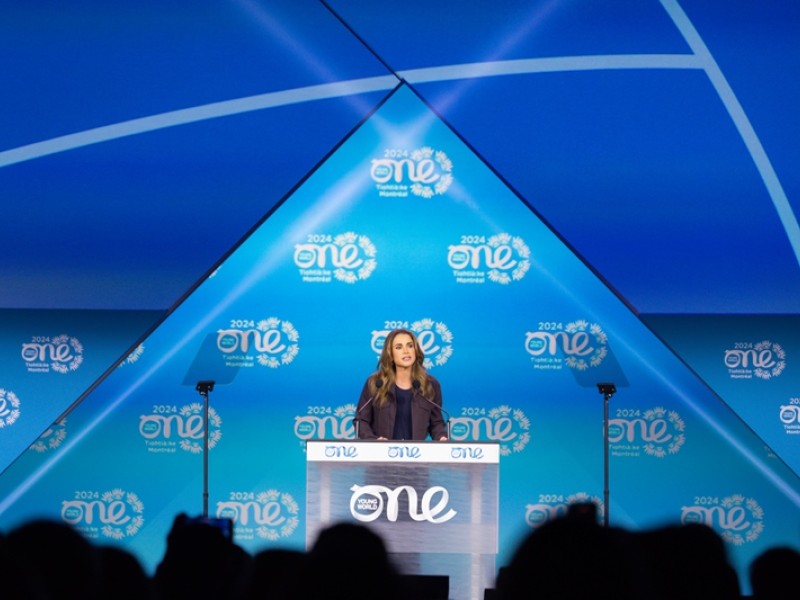Queen Rania's Speech at Le Web '09 - Paris, France

Thank you, Loïc, for that kind introduction. Coming from France’s chief executive blogger, that’s high praise indeed! I’m happy to see so many leading tech execs and web wizards all in one place – even if the average age is closer to a college dorm room than a company boardroom! And it’s OK… I don’t mind that you’re all looking at your i-Phones and Blackberries. I knew you’d be blogging, posting, or tweeting your way through this, which is why the remainder of the speech will be in 140-character sound bites or less. So let me start with a question: Did Michael Jackson change the course of what is now known as the Green Revolution in Iran? Think about it and I’ll come back to it later. In the meantime, here’s one you can use… (On screen: @QueenRania asking if Michael Jackson changed course of Green Revolution in Iran. I don’t remember seeing that in This Is It…#leweb09) As you ping that off to the world you embody this year’s conference theme: the “real time web”. As you know, this is the next phase in the evolution of the Internet. First we had the static web, then the social web. Today we have the world at our fingertips, not as it was 5 days, 5 hours, or 5 minutes ago, but as it is right now. It’s an exciting time that has people like Loïc making predictions about the future. One prophecy was that we’ll follow inanimate objects as well as friends. Charles de Gaulle airport will tweet that it’s snowed in. Major motorways, like le périph, will be tweeting that they’re jammed with traffic. Personally, I can’t wait to follow my fridge so I know when it’s run out of chocolat! (On screen: @QueenRania recommending I follow my fridge on Twitter… #leweb09) And yet, the Internet also has an intensely personal side. The web is more human than ever before as we “life-stream” the daily details of our existence… sending our shout outs to the world: this is what I’m doing right now. Our thoughts, emotions, and actions increasingly live online. It will be a time when the net represents our souls and our souls get an IP address… This is humanity in binary: the human race living in a digital space. As industry leaders, you’re doing more than documenting our web migration: you’re driving it towards new horizons. Whatever your profession – developer, blogger, entrepreneur – you are part of a new field of digital anthropology, tracking and discovering the latest applications that let us represent our true selves online. In short, you’re this century’s Digital Darwins, at the bleeding edge of our own e-evolution. Ironically, as our on- and offline personas merge, I find that my virtual self can get closer to people more easily than my real self. It’s one of the reasons I leapt into the digital fray with YouTube, Facebook, Flickr, and Twitter. Because, to be honest, it can be hard to connect with people when you’re a Queen. The position comes clouded in protocol and people tend to succumb to a quiet deference in your presence, and that can be frustrating. But online, people are not afraid to speak their minds. Social media has opened a window into my life and helped demystify who I am and what I do. But it has also created a space where titles mean little and everyone is free to say what they please. This direct and personal connection lets people reach out to me, and it also helps spread ideas and causes I’m passionate about – how else can anyone talk with a million people, around the world, all at once? Sure, I get dubbed a “monarch on a mission”… but I take it as a compliment, because I can’t help but feel inspired by the potential I see. Yet as our online and offline identities blur… we mustn’t forget one important question: can the real time web bring real world change? (On screen: Can the real time web bring real world change? #leweb09) Can it help tackle some of the big challenges facing our global community? Poverty. Disease. Education. In the olden days, you’d have to take a question like that to the Oracle at Delphi. I took it to Twitter. A few weeks back, I asked my followers if they thought online activism could change the offline world. And I got tons of feedback – lots of great ideas. But, I must admit, I was surprised. The majority did not believe digital advocacy could translate into analogue action. They couldn’t see retweeting or joining Facebook groups as leading to volunteering or rallying. As one follower wrote, the problem was it would “prove difficult to get their butts outta their computer chairs”. (On screen: Jae143 - @QueenRania it can change the way ppl think but may prove more difficult 2 get their butts outta their computer chairs 2 do something abt it) It seems that when people think of the real time web, they think of their online social networks, they think of finding old friends, sharing new photos, all in an instant. They also think that virtual movements lead to… virtually nothing. But what about the post-election protests in Iran last June? For weeks they dominated traditional media. Headlines were fuelled in part by the enormous online explosion. Countless retweets, videos, up-to-the-second news from the streets of Tehran. And then… Michael Jackson died. Suddenly, we were all atwitter about the loss of a music legend and Iran was no longer trendy nor trending. Which brings me back to my original question. Did MJ change the course of the Green Revolution? Now, of course, he did not; the situation was much more complex than that. But, the question highlights an important point: in the online world, where causes come to you, you can pick and choose your favourite, no money down. The upside is exponential growth in awareness. The downside is, with little personal investment, online activism becomes fleeting. That’s why so many people don’t yet believe social networks are really helping solve social problems. It’s still just “life-streaming” not “life-changing”. It’s about where we are, not where our world needs to go. But I think we’re at a tipping point. Change can happen because real time is the new primetime. It’s a source for news, a platform to collaborate, a mouthpiece to mobilize. From the Twittersphere, I learned how one group raised money for a food bank in Canada by holding a social media auction… how an internet tax was scrapped in Mexico when it trended for two weeks on Twitter… how Avaaz.org has clocked up 3.5 million members and over 14 million actions in three years, including petitions, rallies, and fundraising drives. (On screen:· Geoffreywiseman - @QueenRania Look at events like #HoHoTO as examples of online activism making an offline difference.· Osalazar - @QueenRania yes it does. mexicans got rid of "Internet tax" a couple of weeks ago. internetnecesario.org· Hippo_crit - @QueenRania yes online activism can. Avaaz.org is an example where they can mobilize millions in hours to sign petitions n take action –ht) In my part of the world, I was proud to see Jordanian company WatWet – the Arab equivalent of Twitter – being used last January to aid victims of the war in Gaza. Directed by social media, Jordanians flocked to sort donations for women and children who had lost everything: food, clothes, homes. And one of the most extraordinary examples was when typhoon Ketsana crashed into the coast of the Philippines three months ago. Locals rallied volunteers and aid through Facebook, Multiply and Plurk… using sites like Google Maps, to pinpoint the worst affected areas… literally saving lives. People countered the floodwaters with a flood of their own: with information, money, and action that surged through their online social networks. Digitizing our self has heightened our instinct to be selfless. What we need now is to amplify our actions. One of my passions is desperately in need of this kind of action: education for all. Around the world, there are 75 million children out of school. That’s 15 times the population of Paris. (On screen: Pop. of Paris X 15 = No. of kids out of school = 75m #leweb09) More than 55 percent of these children are girls… denied the chance to even read a book let alone use a computer! If we could send these children to school, it would mean enormous benefits for everyone… the positive effects cascading outwards, going viral. The ultimate app. For example, with every extra year of good, quality education, their income could increase by 10 percent. That’s more families clothed and fed, fewer in poverty. (On screen: Extra year of quality schooling = higher future income of 10% #leweb09) If every child started receiving an education right now, we’d prevent 7 million cases of HIV/AIDS in the next decade. That’s more lives saved, fewer children orphaned. (On screen: Every child in school now = 7 million cases of HIV prevented in next 10 yrs #leweb09) Beyond the statistics, education promotes what we all want: peace and stability. But behind the statistics is something more important: little girls and boys… children, like Musu, who saw devastation and atrocities during the civil war in Liberia. When I met her, she told me how she couldn’t go to school during the war and how she lost her hand in a rocket attack. Now she loves going to school and is proud she can write well, despite her injury. She dreams now of one day becoming a doctor, because, as she said, “a doctor helped me with my hand”. The classroom can be a chrysalis for change, yet most people don’t realise the power of education. 1GOAL is a project that I co-founded with the Global Campaign for Education to champion that potential. In partnership with FIFA… with world-class football stars like Michael Owen and Thierry Henry… with global leaders like Prime Minister Zapatero and Prime Minister Brown… we’re going to make the real time web bring real world change for 75 million children. With the latest online tools and tactics, 1GOAL will tap the energy and excitement of next year’s World Cup in South Africa… leaping from the web to the world, enlisting volunteers and gathering supporters. By the end of the most watched sporting event of 2010, we want 30 million signatures supporting 1GOAL. We want 30 million people demanding their leaders don’t just talk, but act to make education for all a reality. As the Digital Darwins of our world, you can help. With all the richness of talent in this room, you can help. With all the imagination that is here right now, you can help. From April 19th 2010 until the final whistle of the World Cup on July 11th, we want you to dedicate 1 DAY for 1 GOAL. (On screen: 1 DAY for 1GOAL) 1 DAY for 1 GOAL is about devoting your blog, brand, or best-selling product to helping those children who are locked out of school and locked into poverty. MySpace has already stepped up, pledging to plaster their site with 1GOAL for a day and encourage millions of users to sign up. You can commit to 1GOAL, too. Tweet or Direct Message me your ideas and we’ll take it from there. Whatever plan you hatch, do it online, and do it big. Try to reach as many people as possible, so that offline, leaders have to listen. Have to act. As well as 1 DAY for 1 GOAL, my challenge to you is to help deepen the links between the web and the world… to find new ways people can make their own leap from virtual activism to real action. Push that technology to its limits, runwith that risky idea, and bring our on- and offline lives into synch. Because remember, for all the widgets and gadgets out there, the real time web is a real human experience that could bring real change to humanity. You are the ones who can help link online activism to reality, to finally make life-streaming life-changing. Thank you. (On screen: @QueenRania says sign up to 1GOAL! I just have. You can too! www.join1goal.org #leweb09)
مواضيع مختارة
موقع جلالة الملكة رانيا العبدالله الرسمي
هذا الموقع الإلكتروني لا يدعم متصفحات الإنترنت القديمة. الرجاء تحديث متصفح الإنترنت إلى نسخة أحدث من إنترنت إكسبلورر 9
متصفح الإنترنت الذي تستخدمه قديم. لتحسين مستوى الأمان عند تصفح مواقع الإنترنت و مشاهدتها بالشكل الصحيح و بفعالية افضل قم بتحديث متصفح الإنترنت الخاص بك



